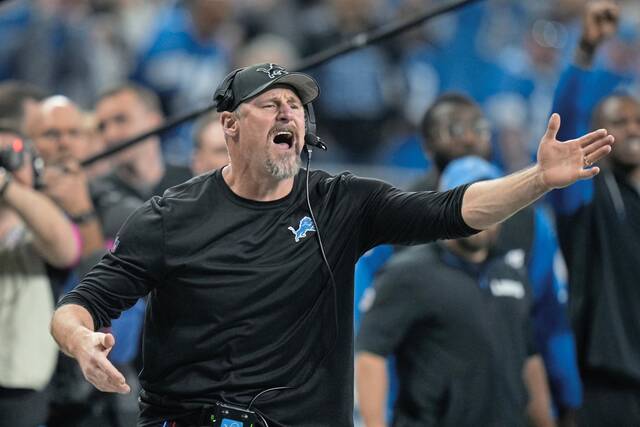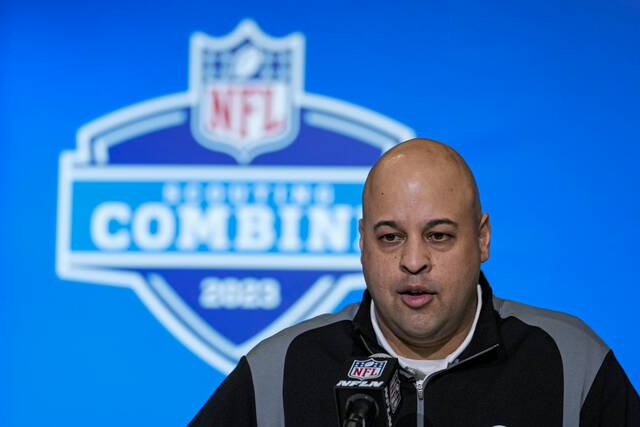This week’s vote at the NFL owners meetings as to whether or not the league should adopt a playoff format change is typically stupid, prisoner-of-the-moment, 2025-style overreaction.
Mark Maske of the Washington Post is reporting that the proposal is unlikely to pass. Let’s hope he’s right.
As of now, winners of the four divisions from both conferences — East, West, South and North — get an automatic playoff spot and a first-round home game regardless of record. The team with the best record in each conference gets a first-round bye. The other three division winners host wild card teams in the first round, even if those wild card clubs have superior records.
The Detroit Lions have submitted a proposal to change that format so that all seven playoff teams would be seeded strictly based on record. Winning a division would only come into play as a seeding tie-breaker over head-to-head.
So — just to catch you up — winning a division wouldn’t matter in playoff seeding, but it would matter to get you in the playoffs in the first place and to break a tie in seeding.
Does that make any sense to you? It doesn’t to me.
That proposal is basically saying, “Winning a division is important, but only when we say it is! Otherwise, it doesn’t mean anything.” The NFL would be moving the goalposts on its own playoff qualifications.
What it would have looked like
If this plan had been around in 2022 when Tampa Bay won the NFC South at 8-9, that would’ve been good enough to qualify for the playoffs in front of Washington (8-8-1) and Detroit (9-8) as the champ of a lousy division.
But the Buccaneers would’ve had to go on the road to face San Francisco (13-4), who was the No. 2 seed after winning the West. The 13-4 NFC North champion Minnesota Vikings would have remained the No. 3 seed and hosted the third wild-card team (Seattle at 9-8). As the top wild card, the 12-5 Dallas Cowboys would’ve actually been No. 4 and hosted the 9-7-1 New York Giants.
What it could look like
That said, if we seed 1-7, then that carries into the second round, too, doesn’t it?
Then the conversation ceases to be about granting “fairness” to occasionally superior wild-card teams that have to go on the road to play winners of crummy divisions. Now, in Round 2, we are talking about potentially sending very worthy division winners on the road to play a wild-card team.
Consider this scenario:
• Kansas City wins the AFC West at 15-2 and gets the AFC’s bye. The Los Angeles Chargers come in second at 14-3. They have the two best records in the AFC and are the top two seeds.
• Buffalo wins the East at 13-4 and claims the third spot. The North champion Steelers are 13-4 (stop laughing) and the No. 4 seed because they lost to Buffalo in the regular season.
• Assuming all three of those teams advance through “Super Wild Card Weekend” to join K.C., the Chargers would get to host a (now) 14-win division champ in sunny California as a wild-card team instead of having to play in Buffalo in the second round.
• Not only that, but if the Steelers should win in Arrowhead (I said, ‘Stop laughing’), they’d have to play a second-straight road game as a (now) 15-win division champ in a wild-card team’s building.
• Worse yet, what if the Steelers or Bills happened to beat the Chargers in regular-season play on top of all that?
At some point, something goofy like that will happen under this format. Look at last year’s NFC standings. It almost happened.
If Philadelphia had one extra loss to fall to 13-4, the eventual Super Bowl-bound Eagles would’ve been seeded behind two NFC North teams — the champion Lions and the wild-card Vikings.
Another option
At most, the NFL should implement a change where a top wild card could host the worst division winner, if that fourth-seeded division champ has a lesser record than the top wild card. Although I suppose that could extend to the second wild card as well.
After all, this past season, the top NFC wild-card team was the Minnesota Vikings at 14-3. They traveled to play the Los Angeles Rams at 10-7, who won the West and were the No. 4 seeded division winner. The second wild-card team was Washington at 12-5. The Commanders had to go to Tampa to play the No. 3 Bucs (10-7) as the sixth seed.
Should both Minnesota and Washington have gotten home games? How far out do we want to stretch this? This stuff is all cyclical. It changes every year. Let’s not overreact to last year’s NFC standings.
In 1984, the Steelers made the AFC title game as a 9-7 AFC Central champion. In 2005-06, they were a Super Bowl-winning team that barely made the postseason as the last wild card.
It comes and goes.
But, as Pro Football Talk’s Mike Florio pointed out, this wasn’t really Detroit’s idea. The Lions’ position of advancing this discussion was planted by Roger Goodell to put another seeding element in play so fewer teams rest fewer players the last week or two of the regular season to pump up the importance of more stand-alone games. That’s what’s at play here. Not “equity” or fairness.
Pfft! Those trains left the station a long time ago. Ask the Steelers, Ravens, Texans and Chiefs about their Wednesday Christmas games last year.
Actually, don’t. I’m sick of hearing that as an excuse for the Steelers’ collapse last year. But you get the point.
The NFL needs to decide if winning a division matters or not. If it does, leave the format alone. If it doesn’t, blow up the divisions and open up the schedules to branch throughout the conferences more frequently.














